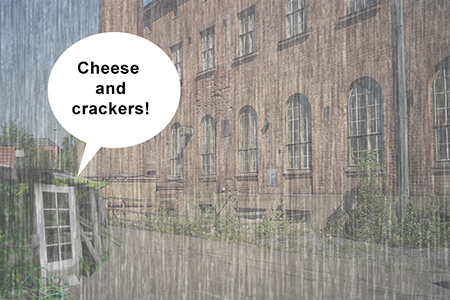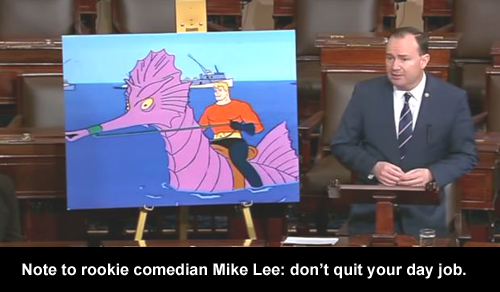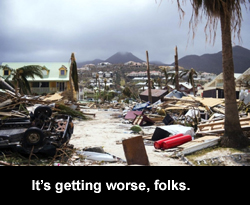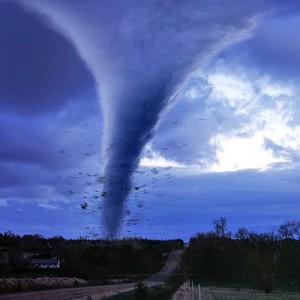 Hmmmm. That looks like light coming in. Not necessarily a bad thing, except that’s a wall, not a window. So, I don’t know… somewhat problematic.
Hmmmm. That looks like light coming in. Not necessarily a bad thing, except that’s a wall, not a window. So, I don’t know… somewhat problematic.
Okay, it turns out that a potting shed is not the best place to hide during a hurricane or other extreme weather event. Who knew? Seemed sturdy enough when we moved in. I know you’re used to hearing us complain about nearly everything, but we had very few complaints about the shed, aside from the fact that there was no screen for the fireplace. Our landlord’s response? “Run for your lives! The potting shed doesn’t HAVE a fireplace!”
Yesterday the wind started kicking up and water came pouring down from the heavens like one of those super soaker shower heads. (Actually the shower head is like the rain, but never mind.) Then the entire structure started to sway lazily in the wind. Far from keeping the weather out, the shed was practically inviting it in, and frankly, this shed isn’t big enough for me and some screaming ‘nado. Well, there was some noise, and Marvin (my personal robot assistant) sounded the alarm klaxon (really just a digital recording he plays back on such occasions). The shed lifted up and came down like a tossed coin, rolling around on its edges as it came to a clumsy stop.

Naturally, we broke out our foul weather gear, which looks pretty much like our fair weather gear, except that we keep it in a different cardboard box. I do have one Gorton’s Fisherman style hat that allows me to cross the courtyard on occasion and pound on the hammer mill door in hopes that our nasty neighbors will grow a compassion bone and decide to let us back in. No luck yet, but what the hell. I’ll tell you, this puts a real damper on rehearsals. There aren’t a lot of genuinely waterproof instruments in the kind of music we play, so our songs start to sound a bit waterlogged by the end of the first half-hour.
I don’t know … how long does it take a sousaphone to rust? Depends on the brand, I’m guessing. Got an umbrella …. anyone?


 There are people in this country – coastal urban mayors and the like – who have to face facts on this issue, but pretty much everyone else is free to ignore the obvious: that we are now living in a far more dangerous and unstable environment, and it’s only going to get worse. The longer we play this denial game and pretend it doesn’t exist, the more profound the long term costs will be. Unfortunately, this is a difficult issue to get traction on in a country like the United States. You find yourself arguing for a major change in people’s day-to-day lives, tremendous investments, and more, for positive effects that likely won’t become evident for another generation or more. It’s a crisis that breeds fatalism, and that plays right into the hands of the petrochemical-driven profit machine that’s been stoking climate change for decades.
There are people in this country – coastal urban mayors and the like – who have to face facts on this issue, but pretty much everyone else is free to ignore the obvious: that we are now living in a far more dangerous and unstable environment, and it’s only going to get worse. The longer we play this denial game and pretend it doesn’t exist, the more profound the long term costs will be. Unfortunately, this is a difficult issue to get traction on in a country like the United States. You find yourself arguing for a major change in people’s day-to-day lives, tremendous investments, and more, for positive effects that likely won’t become evident for another generation or more. It’s a crisis that breeds fatalism, and that plays right into the hands of the petrochemical-driven profit machine that’s been stoking climate change for decades. Now, I’m not complaining. Upstate is nothing like Moore, Oklahoma, not by a long shot. But there can be no doubt that the weather here and everywhere else in the country is getting more severe. There is far more energy behind some of these storms than is normal. It takes a few mornings of driving through wreckage to drive home the notion that this may be the new normal. This may be the best we can expect in the years ahead. That is a disastrous prospect.
Now, I’m not complaining. Upstate is nothing like Moore, Oklahoma, not by a long shot. But there can be no doubt that the weather here and everywhere else in the country is getting more severe. There is far more energy behind some of these storms than is normal. It takes a few mornings of driving through wreckage to drive home the notion that this may be the new normal. This may be the best we can expect in the years ahead. That is a disastrous prospect.